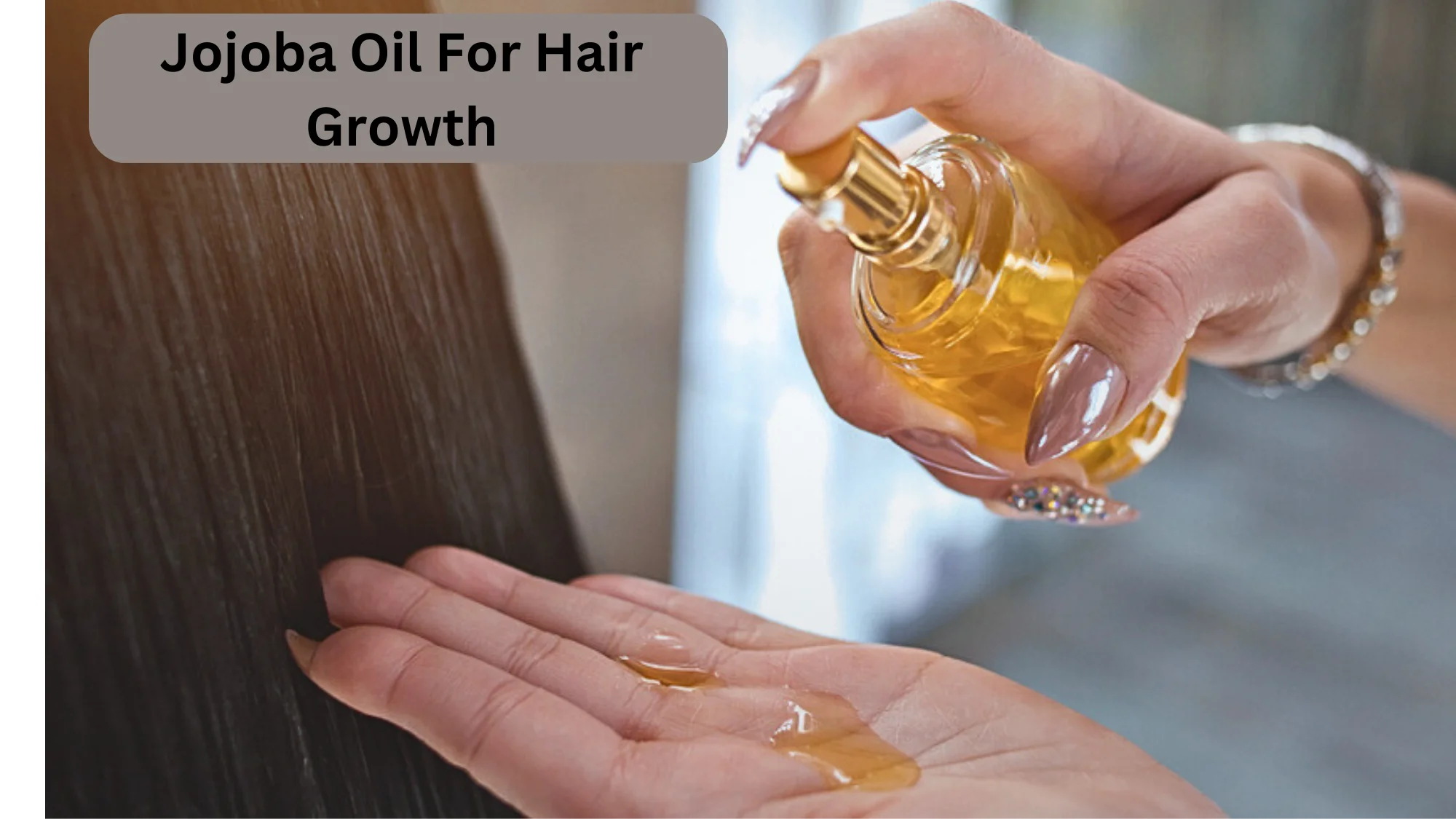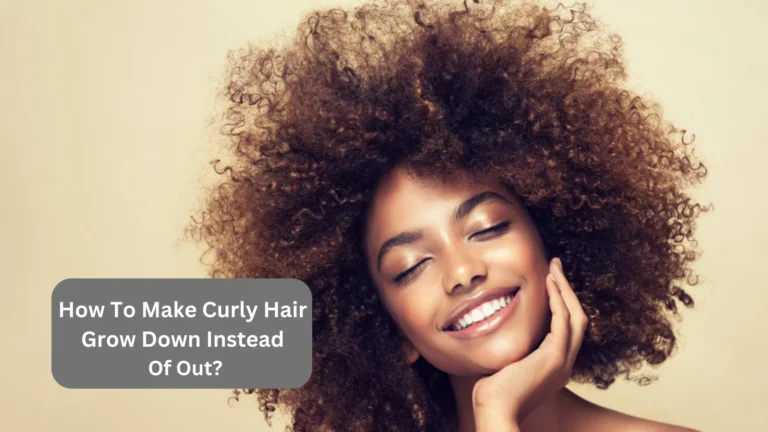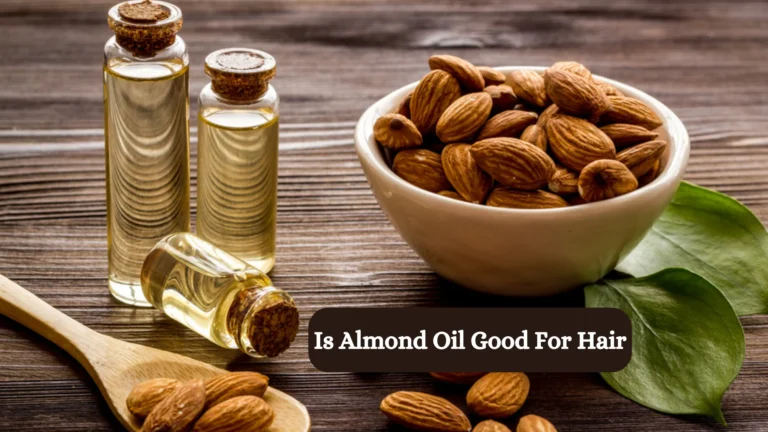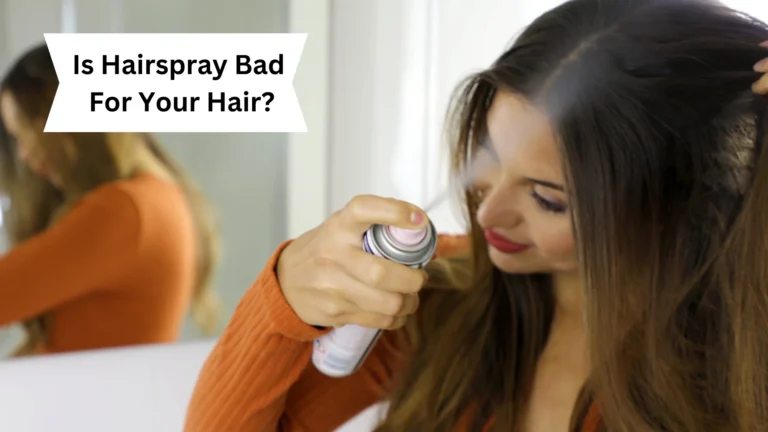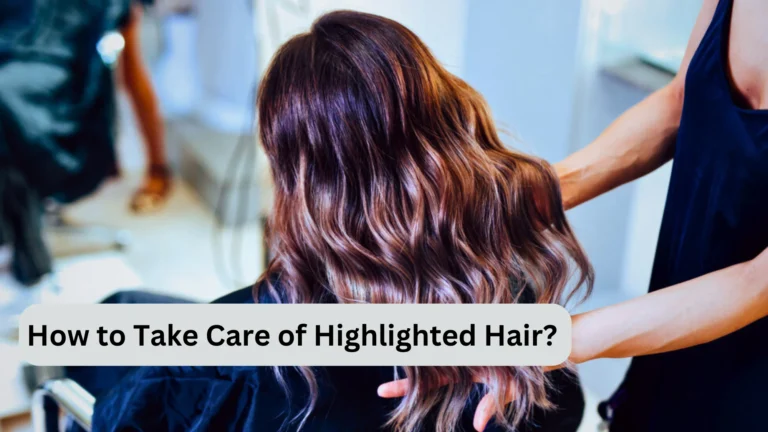Jojoba Oil for Hair Growth – Benefits, Uses, Side Effects!
Jojoba oil has gained huge popularity in recent years for its incredible benefits for hair growth. This natural oil, extracted from the seeds of the jojoba plant, has been used for centuries by many tribes to promote healthy hair growth.
Jojoba oil is rich in vitamins, minerals, and essential fatty acids that help to nourish the scalp and strengthen the hair follicles, thereby reducing hair fall and promoting hair growth.
However, as with any natural remedy, there are potential side effects and precautions to be aware of before using jojoba oil for hair growth. In this article, we will explore the benefits, uses, and side effects of jojoba oil for hair growth. So, let’s begin!
Benefits of Using Jojoba Oil for Hair Growth
Applying Jojoba oil to the scalp is a natural and effective remedy for promoting hair growth. Here are some of the benefits of using jojoba oil for hair growth:
Nourishes the Scalp
Jojoba oil is a highly nourishing oil that can provide many benefits to the scalp. It is a great moisturizer that can penetrate deeply into hair follicles, preventing dryness and flakiness.
Jojoba oil is high in fatty acid and can help balance sebum production in the scalp, preventing it from becoming too oily or too dry.
Jojoba oil is also rich in essential nutrients such as vitamins E and B-complex, zinc, and copper, which are essential for the health of the scalp and can nourish hair follicles.
Strengthens Hair Follicles
Jojoba oil is a powerful ingredient that can strengthen hair follicles in many ways.
Firstly, jojoba oil has antibacterial properties that can help to prevent scalp infections, which can lead to hair loss. By preventing infections, it helps to maintain a healthy environment for hair follicles to grow.
Furthermore, jojoba oil is an excellent moisturizer that can penetrate deeply into hair follicles, preventing dryness and breakage. This moisturization helps to keep hair follicles healthy and strong.
Reduces Hair Fall
Jojoba oil’s ability to unclog hair follicles and remove oil buildup can contribute to reducing hair fall. Sebum is a natural oil produced by the scalp to moisturize and protect the hair. However, excessive sebum buildup can clog hair follicles, leading to weak and thin hair strands that are prone to breakage and fall.
Jojoba oil’s moisturizing properties help to balance sebum production and prevent excessive buildup, thus promoting healthy hair growth and reducing hair fall. Moreover, its nourishing properties help to strengthen hair strands, making them less prone to breakage and fall.
Promotes Hair Growth
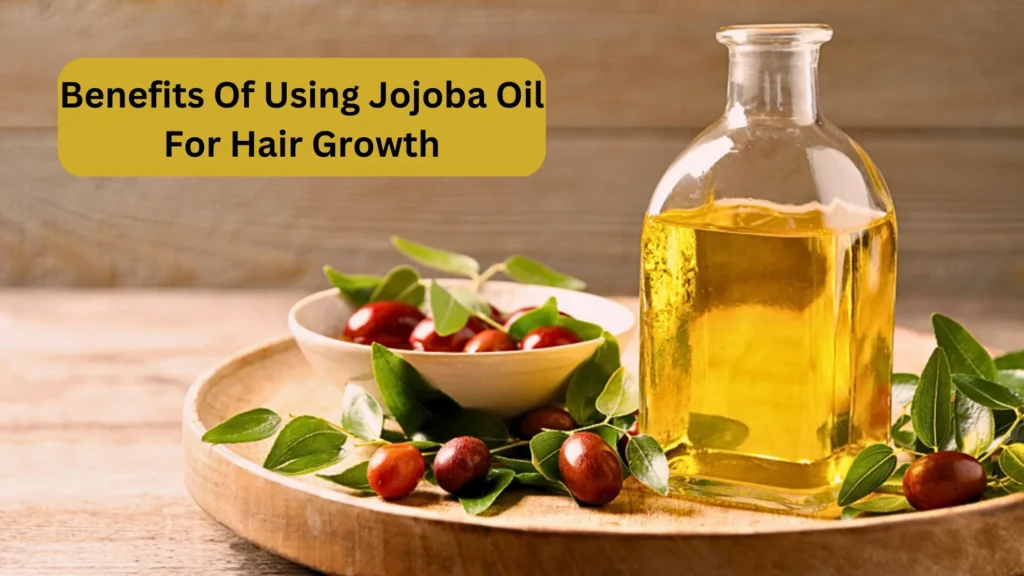
Massaging jojoba oil into the scalp can also help to increase blood flow to the hair follicles, delivering essential nutrients and oxygen, and promoting healthy hair growth.
Research shows that Jojoba oil’s protective properties help to shield the hair from damage caused by environmental factors such as UV radiation and pollution. Protecting the hair, it helps to prevent damage to hair follicles and promotes healthy hair growth.
Moisturizes and Conditions Hair
Jojoba oil is an excellent natural moisturizer and conditioner for hair. Its chemical composition is similar to the natural oils produced by the scalp, making it easy for the hair to absorb and utilize.
When applied to the hair, it penetrates deeply, moisturizing the hair from the inside out. This deep moisturization helps to prevent dryness and brittleness, making the hair soft, smooth, and easy to manage.
Additionally, jojoba oil helps to seal moisture into the hair shaft, preventing it from escaping and keeping the hair hydrated for longer periods. This moisturization and hydration help to prevent split ends and breakage, keeping the hair healthy and strong.
Prevents Dandruff
Jojoba oil is effective in preventing dandruff due to its antibacterial and antifungal properties. Dandruff is caused by an overgrowth of yeast on the scalp, which leads to inflammation and flaking of the scalp. Jojoba oil’s antifungal properties help to combat this yeast overgrowth, preventing dandruff from forming.
Additionally, jojoba oil’s moisturizing properties help to soothe and hydrate the scalp, reducing inflammation and preventing the formation of dry, flaky skin.
Furthermore, using jojoba oil for dandruff is an effective remedy to reduce dandruff. By unclogging hair follicles and removing sebum buildup, jojoba oil contributes to preventing dandruff.
Improves Hair Texture
Jojoba oil can improve hair texture in several ways. The reason is its moisturizing properties that help to hydrate the hair strands, making them softer and smoother. This improved hydration helps to reduce frizz, tangles, and roughness, resulting in improved hair texture that feels smoother to the touch.
Safe for All Hair Types
Jojoba oil is generally considered safe for all hair types. It is non-toxic, non-irritating, and hypoallergenic, making it a gentle option for most individuals, including those with sensitive scalps or skin.
Jojoba oil is also suitable for all hair textures, including straight, wavy, curly, or oily hair. It does not discriminate based on hair type and can provide benefits to all hair types.
How to Use Jojoba Oil for Hair Growth?
Jojoba oil can be used in various ways to promote hair growth. Here are some tips on how to use jojoba oil for hair growth:
Scalp Massage
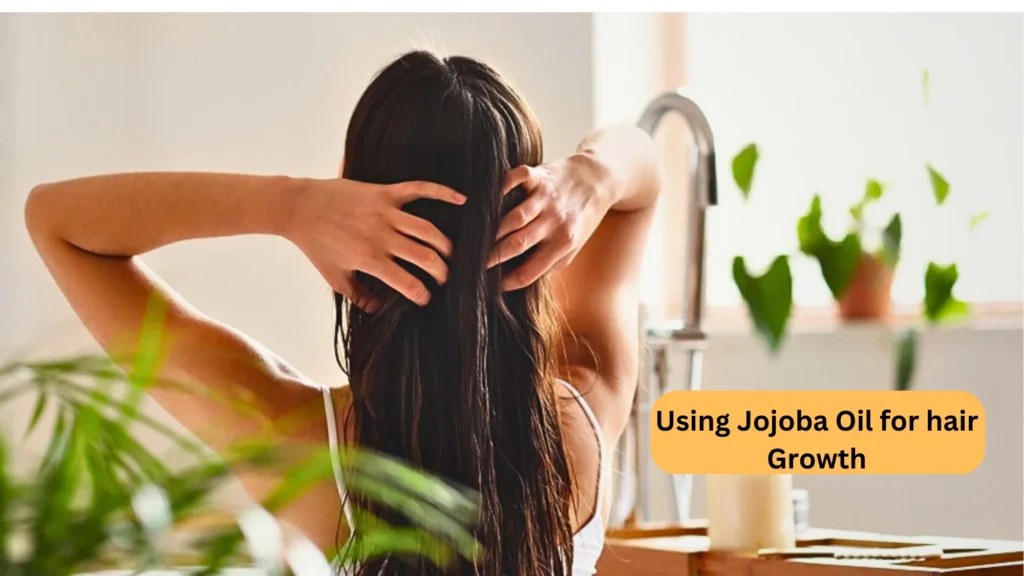
Scalp massaging with jojoba oil can help to stimulate blood circulation to the hair follicles, nourish and moisturize the scalp, and promote healthy hair growth. It’s recommended to do this at least once a week for the best results. To scalp massage jojoba oil, follow these steps:
- Start by warming a small amount of jojoba oil in your palms. You can do this by rubbing your hands together or placing the oil in a small container and placing it in warm water for a few minutes.
- Part your hair into sections and apply the oil to your scalp using your fingertips. Start at the front of your scalp and work your way to the back, applying the oil in a gentle circular motion.
- Apply enough pressure to feel the oil penetrate into your scalp, but not so much that it causes pain or discomfort.
- Continue massaging your scalp for at least 5-10 minutes, or longer if you have the time.
- Once you’ve massaged your entire scalp, leave the oil on for at least 30 minutes, or longer if possible. You can cover your hair with a shower cap or towel to keep the oil from dripping.
- After the recommended time has passed, wash your hair with a mild shampoo and conditioner to remove the oil.
Hair Mask
Using a jojoba oil hair mask can deeply condition and moisturize your hair, improve scalp health, and promote hair growth. It’s recommended to apply a hair mask once a week for the best results. You can customize the hair mask based on your hair needs and preferences by adding other natural ingredients that are beneficial for hair growth and health. To use jojoba oil as a hair mask, follow these steps:
- Start by mixing jojoba oil with other beneficial hair oils or natural ingredients like honey, yogurt, or aloe vera to create a hair mask. You can use a ratio of one part of jojoba oil to one part of another oil or ingredient.
- Apply the mixture to your hair and scalp, starting at the roots and working your way to the ends. Use your fingertips to massage the mask into your scalp.
- Once you’ve applied the mask to your hair, cover your hair with a shower cap or towel and leave it on for 30 minutes or overnight.
- After the recommended time has passed, wash your hair with mild shampoo and conditioner to remove the mask.
Leave-in Conditioner
Using jojoba oil as a leave-in conditioner can help to nourish and moisturize your hair throughout the day, prevent tangles and frizz, and promote healthy hair growth. It’s recommended to use a small amount of jojoba oil as a leave-in conditioner, as using too much may weigh down your hair. Start with a pea-sized amount and adjust as needed.
To use jojoba oil as a leave-in conditioner, follow these steps:
- Start with clean, damp hair. You can wash your hair with shampoo and conditioner and towel dry it until it’s slightly damp.
- Take a small amount of jojoba oil in your palms and rub it between your hands to warm it up.
- Apply the oil to your hair, starting at the ends and working your way up to the roots. Be sure to focus on the ends of your hair, which are typically drier and more prone to damage.
- Use a comb or your fingers to distribute the oil evenly throughout your hair.
- Style your hair as usual, and leave the oil in your hair as a leave-in conditioner.
Hot Oil Treatment
Using jojoba oil as a hair oil treatment can help to deeply moisturize and nourish your hair, prevent split ends, and promote healthy hair growth. You can adjust the amount of jojoba oil based on the length and thickness of your hair. To use jojoba oil as a hair oil treatment, follow these steps:
- Start with dry hair. You can brush or comb your hair to remove any tangles or knots.
- Take a small amount of jojoba oil in your palms and rub it between your hands to warm it up.
- Apply the oil to your hair, starting at the roots and working your way down to the ends. Be sure to focus on the ends of your hair, which are typically drier and more prone to damage.
- Use your fingertips to massage the oil into your scalp and hair for at least 5-10 minutes, or longer if you have the time.
- Once you’ve massaged your entire scalp and hair, cover your hair with a shower cap or towel and leave the oil on for at least 30 minutes or overnight.
- After the recommended time has passed, wash your hair with a mild shampoo and conditioner to remove the oil.
Side Effects of Jojoba Oil
Jojoba oil is generally safe to use for hair and skin, and there are no known serious side effects associated with its use. However, some people may experience mild allergic reactions or skin irritation after using jojoba oil.
- If you notice any redness, itching, or swelling after using jojoba oil, discontinue use and consult a healthcare provider.
- It’s also important to note that jojoba oil is heavy oil, and using too much of it on your hair can make your hair look greasy and weighed down. Therefore, it’s recommended to use jojoba oil in moderation and adjust the amount based on the length and thickness of your hair.
- Also, it is always a good idea to do a patch test before using any new product, including jojoba oil, to ensure that you don’t have an allergic reaction or skin irritation.
Wrapping Up
To sum up, jojoba oil is a versatile and natural product that offers numerous benefits for hair growth, texture, and overall hair health. Its unique molecular structure, which closely resembles that of the natural oils produced by our skin, makes it an effective moisturizer and conditioner for all hair types, without leaving any greasy residue. Regular use of jojoba oil can nourish the scalp, strengthen hair follicles, and reduce hair fall, while also improving hair texture and preventing dandruff. That means using jojoba oil for hair growth can help you achieve healthier, stronger, and more beautiful hair.
You Might Also Like: Can Hair Oil Go Bad? Unveiling the Truth About Hair Oil Shelf Life!
FAQs
Which is Better Coconut Oil or Jojoba Oil For Hair?
It depends on your hair problem. Coconut oil may be better for those with dry or damaged hair, while jojoba oil may be better for those with oily or sensitive scalps. Remember that everyone’s hair is different, so it may take some time and effort to find the best oil for your hair.
Can You Put Jojoba Oil in Your Hair After Shower?
Yes, you can definitely use jojoba oil in your hair after getting out of the shower. In fact, this is a great time to apply jojoba oil, as your hair is clean and the oil can be easily absorbed easily.
Can I Use Jojoba Oil On My Hair Everyday?
Yes, you can use jojoba oil on your hair every day. If you have dry or damaged hair, you may benefit from using jojoba oil daily to help nourish and moisturize your hair. However, if you have an oily scalp, use jojoba oil once or twice a week to get the best results.
Is Jojoba Oil Good For Dry Scalp?
Yes, jojoba oil is an excellent choice for people with dry scalps. It is similar in composition to the natural sebums (oils) produced by the scalp, which makes it easy to absorb and nourish.

